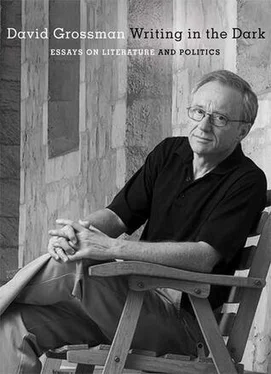After spending a century in all-out war and becoming accustomed to seeing anyone who threatens us as an enemy to the death, and having the concept of “enemy” ingrained in us so deeply, almost from birth, and living in an environment in which the concept is so highly available, because of the hostility and the constant acts of violence — after all this, eventually our compasses and healthy instincts go awry, and then, in almost any situation of conflict and disagreement, even one’s brother looks like the enemy. It is enough for his opinions and habits to be different from our own, for his desires to be distinct from our own, for his interpretation of a situation to be different from ours, for our brother to become, in our minds, in our fears, an enemy.
When I say this, I fear that after decades of spending most of our energies, our thoughts and attention and inventiveness, our blood and our life and our financial means, on protecting our external borders, fortifying and safeguarding them more and more — after all this, we may be very close to becoming like a suit of armor that no longer contains a knight, no longer contains a human . Moreover, I often think that even if this longed-for peace reaches our region tomorrow, in some sense it will already be too late. Because the qualities and the viewpoints and the behaviors that the violence has formulated in us, Israelis and Palestinians, will continue to work their ways on us for many more years. They will not be quick to disintegrate in our bloodstream, both private and national, and they will keep on poisoning our souls, sabotaging the possibility of maintaining a stable peace. Time after time, they will sweep us away and cause us to replay all the same old ills, which will, in turn, create more and more waves of violence.
Let us return to literature for one more moment.
The purpose of literature is the complete opposite of what I have described thus far: in literary writing, we do everything we can to redeem each character in our story from alienation and impersonality, from the grip of stereotypes and prejudices. When we write a story, we struggle — for years, sometimes — to comprehend all the facets of one human character: its internal contradictions, its motives and inhibitions, the boiling magma I talked of earlier.
There is something tender, almost maternal, in the way a writer attunes all his senses, his consciousness and subconscious, his dreams and waking states, to every emotional current and sensation that passes through the characters he has created. There is something naked and exposed, a self-abandonment, in the writer’s willingness to give himself over, unprotected, to the inner workings of the character he is writing about — and, I almost said, communing with.
To write a novel is, to a great extent, to be totally responsible for a few dozen characters. No one will volunteer to write them for us. No one will breathe life into them for us. Sometimes I liken this to a person who is hiding a huge family, several dozen strong, in the cellar beneath his house during a war. This person must go down to the cellar at least once a day to bring food and water to the people. Once in a while he must talk with them about their conditions, try to alleviate their stress, settle the quarrels that erupt among them, offer practical solutions for their immediate troubles. It would also be good of him to tell them about what is going on in the world, listen to their stories and recollections, remind them of all the things they can dream about, and the things they miss, so that they can briefly forget the stifling pit they are trapped in. And then, after doing all these kind things, he must remove their chamber pots and empty them out. Only this person can do all these things; no one can do them for him.
This is exactly the role an author plays for his characters: with all his might, with all his talent and empathy, he must exist in their space — the entire range of human activity that occurs between spiritual talk and the emptying of chamber pots. He must be completely attentive to all their needs, both the spiritual and the corporeal. He must devote himself to them. Body and soul.
If there is one thing I would hope that politics, and politicians and statesmen, might learn from literature, it is this mode of dedication to the situation and to the people trapped in it — after all, they bear significant responsibility for creating the traps, and for the conditions of those trapped. If they are not capable of true dedication, we can demand at the very least that they provide this form of attentiveness, of purposefulness, which is invaluable for reviving the person inside the suit of armor.
By doing so, we remind ourselves again and again of a banal fact that turns out to be so easily forgotten and denied: that behind the armor is a human being. Behind our armor, and behind our enemy’s. Behind the armor of fear, indifference, hatred, and the constriction of the soul; behind everything that languishes within each one of us as these difficult years go by; behind all the fortified walls — there is a human being.
The violence in which we have been living for so long acts naturally and incessantly to turn human beings into faceless, one-dimensional creatures lacking volition. Wars, armies, regimes, and fanatic religions try to blur the nuances that create personal, private uniqueness, the nonrecurrent wonder of each and every person, and attempt to turn people into a mass, into a horde, so that they may be better “suited” to their purposes and to the entire situation. Literature — and not necessarily any particular book, but the attentiveness engendered by direct, profound, complex literature — reminds us of our duty to demand for ourselves — from the “situation”—the right to individuality and uniqueness. It helps us to reclaim some of the things that this “situation” tries relentlessly to expropriate: the subtle, discerning application to the person trapped in the conflict, whether friend or foe; the complex nuances of relationships between people and between different communities; the precision of words and descriptions; the flexibility of thought; the ability and the courage to occasionally change the point of view in which we are frozen (sometimes fossilized); the deep and essential understanding that we can — we must — read every human situation from several different points of view.
Then we may be able to reach the place in which the totally contradictory stories of different people, different nations, even sworn enemies, may coexist and play out together. This is the place where we are finally able to grasp that in true negotiations, our wishes will be forced to encounter the Other’s, forced to recognize their justness, their legitimacy. This is the moment when we feel the sharp growing pains that always attend the arrival of sobriety, and in this case the realization that there is a limit to our ability to mold reality so that it perfectly suits only our own needs. This is the moment when we feel what I called earlier “the principle of Otherness,” whose deep-seated meaning, if you wish, is the rightful existence, the stories, pains, and hopes, of the Other. If we can only reach this Archimedean point, we can begin to dismantle the barriers and detonators that prevent us from solving the conflict.
Because when we know the Other from within him — even if that Other is our enemy — we can never again be completely indifferent to him. Something inside us becomes committed to him, or at least to his complexities. It becomes difficult for us to completely deny him or cancel him out as “not human.” We can no longer employ our usual ease and expertise to avoid his suffering, his justice, his story . Perhaps we can even be a little more tolerant of his mistakes. For we then see these mistakes as part of his tragedy. And if we have any strength and generosity remaining, we can even create a situation in which it is easier for our enemy to step out of his own traps; we too may benefit from this.
Читать дальше












